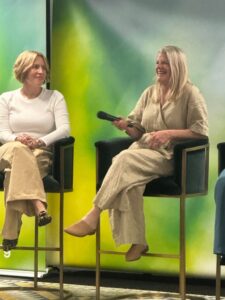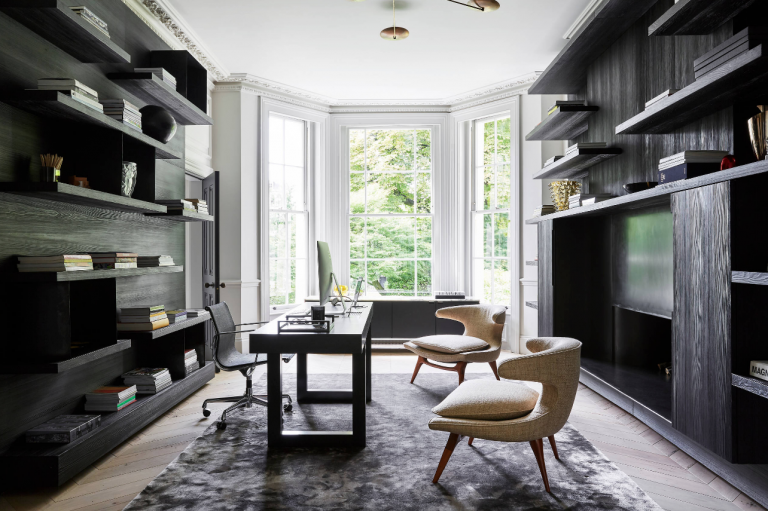Women in design talk success and setbacks

Even some of the most high-profile and well-known women in home furnishings have had moments of career uncertainty. But they have learned to get past them, and they shared their strategies and experiences with a sold-out crowd at the WithIt breakfast at High Point Market earlier this week.
“How She Built This” was a discussion among Erin Napier, designer, author and co-host of HGTV’s Home Town; Egypt Sherrod, principal designer and owner of Indigo Road family of companies, and co-host of HGTV’s Married To Real Estate; Jean Stoffer, owner of Jean Stoffer Design and host of The Established Home on the Magnolia Network: and Susan Hable, founder, artist and designer behind Hable Construction Design Studio. Laura Aldrich, president, consumer products for Brand Journey and Scott Brothers Global, moderated the conversation.
“It’s freeing to know we are all imperfect,” said Stoffer. “The job goes perfectly. Then there are things that you can’t do. To embrace those impossibilities and imperfections — what I call ‘the guardrails of life’ —allows us to do things not imagined before.”

“Right now, I am in the boldest move I’ve ever made,” said Sherrod, who years ago faced unemployment after a successful career as a New York City hip-hop deejay, and later navigated the choppy waters of celebrity branding. “When a celebrity is up, their brand is up. When a celebrity is down, their brand is down.”
Two years ago, she began to rebrand her company as Indigo Road, a resource for home décor and interior design. It was a process that Sherrod said was harder than creating her brand the first time around. “It was like throwing your kid out and saying, ‘Ok, go out into the world.’”
Indigo Road now has placement at JCPenney and Target, said Sherrod. “Those sleepless nights are when you step into your power,” she said.
Napier graduated from college with a degree in graphic design, and her first job was working on a catalog of lighting components. It was not exciting, she said, but it had health insurance — something her father told her was very important. She created wedding invites in her spare time, which caught the eye of a New York City photographer and soon “my side hustle became my whole world.” She kept her day job, taught herself web design and then, after a big leap of faith, put in her two weeks’ notice.
She confessed to having constant worries — about everything, she said, to this day. But when Aldrich asked about panelist’s individual goals, Napier said she takes each day as it comes. “I don’t make plans. I don’t have goals. I only know what feels right and what feels wrong.”
To which Sherrod joked, “I literally make a business plan when I go to Costco.”
The wide-ranging conversation touched on several questions businesswomen often grapple with. Here are some highlights:
On working with a spouse or family member:
Erin Napier: “I work with Ben [Napier, her husband] 24 hours a day. It’s the best thing in my life. We are together constantly, but I think our marriage is incredibly strong because of it.
“For anyone worried about working with their spouse, it might be the opposite — you might become extremely good communicators. Extreme communication is the best part of working with my spouse.”

Jean Stoffer: “I don’t work with my spouse, but I do work with my adult children, after they were all in other careers. Deep down, I respect what they bring to the table. It is the joy of my life.”
Egypt Sherrod: She met her husband, Mike Jackson, on a construction site 21 years ago. “We fell in love over black mold,” she joked. They originally tried to work apart because they thought working together would be too much, she said. “But we’re better together. The best part is that you know you can trust them.”
Susan Hable: She works with her sister and growing up, her family tended to sweep issues under the rug, she said. “We had to have a few fights —power struggles — to get through, but getting to the other side has been a true partnership. If one of us is up, and the other is down, we coach each other out of whatever hole the other is in. It’s a beautiful thing, the family dynamic.”
Practical lessons for scaling a business:
Stoffer: Never invest more in a new endeavor than you can afford to lose. Then “you can work on something without the fear of everything going down.”
Napier: “I say ‘no’ way more than I say ‘yes.’ It’s critical for my sanity.”
Hable: “You can’t dig in and say, this must work.” Knowing that things will be ok if it doesn’t is helpful.















































